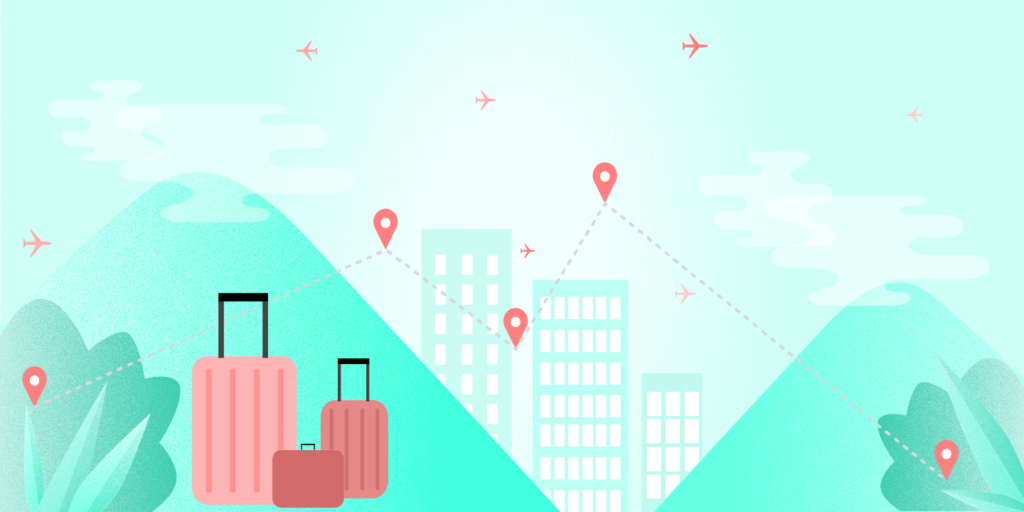Will Covid-19 change the way we travel?

This post is part of a collaborative effort between Startup Portugal, The Next Big Idea, and Sapo24, meant to create relevant content to tackle the COVID-19 pandemic.
Content available in Portuguese.
COVID-19 disrupted the travel and tourism sector globally. In April 2020, approximately 9 out of 10 people in the world lived in countries with movement limitations. Airlines, travel agencies, and other companies related to this business area are among the most affected by the pandemic. It is estimated that 197.5 million jobs in the sector are at risk.
After months of isolation to halt the spread of the coronavirus, some countries are re-establishing free movement of persons, while others are willing to promote tourism again (without mandatory quarantine). Gradually, travelling is becoming part of our daily lives again.
Despite the opening of borders, according to a study by the International Air Transport Association, 36% of travelers located around the world intend to wait at least six months after the virus is contained to fly again. This data foresees difficult months for the tourism sector, and Portugal will also be affected, with a 40% decrease in the number of visitors (less seven million international entries this year, compared to 2019), according to a study by Oxford Economics.
Restoring consumer confidence, on the one hand, and addressing their concerns, on the other, are two essential steps for the industry’s recovery. To this end, the World Travel and Tourism Council launched the “Safe Travels” seal that aims to recognize destinations that comply with health and hygiene rules aligned with the Safe Travel Protocols. Portugal was the first European country to be awarded this seal.
What changes, then, are expected in the way we travel? We compiled some of them below.
The demand for private properties will skyrocket
Even with improved cleaning practices, people will still be afraid to interact with each other. For this reason, they will prefer renting private homes or rural refuges instead of hotels. Searches by the Portuguese on the Airbnb platform have doubled for destinations in the country. The Portuguese now prefer spacious houses for families, with a swimming pool, and pet friendly, for longer stays, between one week and one month. According to Airbnb, the Portuguese “are clearly inclined towards domestic trips that last more than a week”. Also, the president of the Portuguese Association of Local Accommodation, Eduardo Miranda, says that the Portuguese are looking for local accommodation in isolated areas in the interior of the country, especially remote houses with a pool.
How can hotels compete with remote accommodations? Some companies have been working on innovative initiatives to facilitate the adaptation of these type of establishments to this new pandemic reality. One of them is Luggit, a Portuguese startup for luggage storage, collection, and delivery. It launched a platform that allows each hotel to have a service for the collection and delivery of sanitized luggage.
Fewer crowds at tourist sites
Theme parks, museums, and monuments are known to attract vast crowds. However, as these locations reopen and face this new reality, crowds will be more limited and controlled. In some museums, such as the Galleria Borghese, in Rome, or the Louvre Museum, in Paris, visitors buy tickets with time limits.
In Portugal, the recommendations of the head health authority, Direção-Geral de Saúde, are mainly related to the use of a mask, the safety distance between non-cohabitants, and the disinfection of hands. Also, the DGPC(Direção Geral do Património Cultural) created a document with some measures, guidelines, and recommendations for cleaning, disinfecting and conserving cultural assets in the reopening of museums, palaces, and monuments.
Fewer tourists and more expensive trips abroad
Although no one really knows what is going to happen, a press release from the International Air Transport Association estimates that fares will increase by between 43% and 54%, depending on the region. According to the association, the social distance measures will reduce the maximum capacity of the airplanes to 62% when most airlines need their planes to be 77% full to avoid economic losses.
Australian author and entrepreneur, Ross Dawson, predicted the emergence of a new type of class called “isolation class” – a class that will be able to enjoy seats with private partitions or rooms on planes at higher prices. While these people will be able to travel isolated from each other, economy class users will continue to fly without any separation. This idea of paying for social distance was already addressed (and quickly dropped) by Frontier. The company said it would start charging $ 39 [approximately 35 euros] for a guaranteed empty seat next to the passenger.
Weary travelers will stay closer to home
Experts believe that people will start venturing closer to home, while some governments, like the Portuguese, even encouraging domestic tourism. This appeal was also reinforced in June by Turismo de Portugal through a new campaign called #TuPodes, Visita Portugal that challenges the Portuguese to travel to the Best Tourist Destination in the World.
Several indicators prove this trend. The travel insurance comparison website Squaremouth said that based on travel insurance policies purchased through its site between April 1 and May 10 for travel this summer, domestic trips account for 48% of planned summer travel, an increase from 15% last year. At the same time, Travelocity noted that most hotel reservations made on its website are just 160 kilometers away from where tourists live.
New measures for the aviation sector
With growing concerns about the new coronavirus, airports should adopt cleaning and health care policies in an attempt to prevent its spread. Aviation companies such as Lufthansa, American Airlines, Air France, and TAP, among others, have made the use of masks for passengers and crew members mandatory. Qatar Airways is one of several airlines to introduce protective suits for their cabin crew. The autonomous regions of the Azores and Madeira are conducting free tests on Covid-19 (the costs are borne entirely by the regional governments themselves), for passengers who want to visit their islands. In China, tourists have to prove they aren’t infected with the virus. This validation is done through a QR code that classifies citizens as “green”, “yellow” or “red”, depending on the risk of having contracted the virus.
In addition, other technologies are also being tested. One is a voice-activated kiosk to monitor passengers’ temperature, heart rate, and breathing before check-in, and is being tested by Etihad Airways and Elenium Automation. A disinfection and hygiene facility for the whole body called CleanTech is also being tested at Hong Kong International Airport.
An immunity passport
Until a vaccine is developed, the focus will be on assessing the contagion risk of travelers. An immunity passport can be compiled, a document that certifies that someone is immune to COVID-19 by conducting an antibody test and a virus test. However, experts are still unsure whether people who have recovered from the coronavirus are really immune, and some highlight issues that can amplify social inequalities.
Source: https://24.sapo.pt/atualidade/artigos/ira-a-covid-19-mudar-a-forma-como-viajamos
Other blog posts



